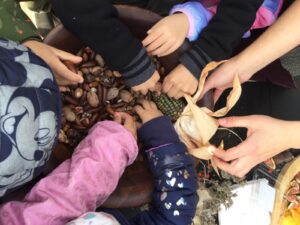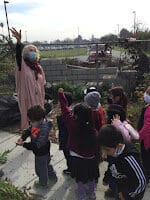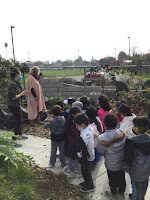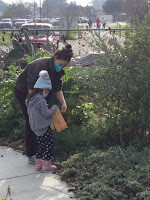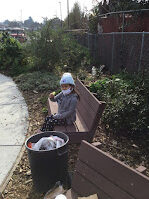Seed Lesson, Educare of Silicon Valley
A window onto our learning together in our garden!
Children arrive with wonder and excitement, knowing from multiple prior experiences with CNGF teachers in the garden that it will be fun! At this point in the semester, children and teachers have shared experiences, gained trust, built relationships, and arrive in the garden feeling comfortable and eager to learn!
It all begins with SEEDS! Observing/feeling size, shape, points, top/bottom, colors, and textures.
Sharing a few basic facts: Without seeds, we wouldn’t have the food we need to be healthy! Who likes to eat popcorn? It starts from a seed! If we collect seeds, and plant them in the soil, food will grow! If we grow our food in our community, we will have what we need to be healthy AND we can help all living things by not burning fuel to take foods from one place to another.
Teachers and children connecting with shared experiences — finding seeds in the garden, sharing the excitement of a successful hunt! Notice the body language that indicates deep listening:
Experiencing a few moments of calm, quiet, safe, independence:
Experiencing a few moments of meaningful connection with a peer:
Indigenous storytelling is woven into our exploration. This story was about patience and gratitude: The turkey gave the other animals seeds of all kinds. The animals waited for the seeds to grow and, after being patient, they harvested, cooked, and ate the food in a fine celebration. The coyote didn’t want to wait for the food to cook, so he decided to cook the seeds before planting them. Nothing grew!
Exploring seeds and leaves with all 5 senses: feeling the seeds, seeing differences and asking “why are these acorns different?”, “why is this corn green?”, tasting sunflower and pumpkin seeds, hearing dried seeds in the gourd, smelling mint and lavender:
Hands-on experience with math concepts: same/different, noticing patterns, counting, sorting, breaking a seed in 2 and noticing half:
Gross motor activity: balancing on uneven ground, running on paths, imitating a turkey, reaching high to the sky and falling to the ground like a floating seed:
Fine motor activity: peeling seeds, revealing ripe ground cherries and peas, eating tiny sunflower and pumpkin seeds:
Community members at work building compost bins: An opportunity to be curious and ask “What are they doing?”, to observe, meet, and appreciate community members doing the important work of building compost bins for the garden, to introduce the role of compost:
Reflecting on past shared experiences in the garden: Returning to the same spot solidifies knowledge and inspires further exploration. The children remember tasting the saltbush leaves and how to find ground cherries ready for harvesting:
Gratitude for the garden’s bounty: On this particular day, we feel gratitude for sweet oranges, figs with many seeds, pumpkin and sunflower seeds, raisins, juice from pomegranate seeds, and greens from the garden:
Educare teachers document: Educare teachers know that recording photos/videos of children learning is valuable. Different audiences for documentation include families, colleagues, community members, and the children themselves. Reflecting on learning experiences allows us to dig deeper into concepts, to build on what we know:
Educare teachers gain professional development: CNGF teachers, knowledgeable about botany, ecology, and native food preparation model and also share meaningful info with Educare teachers during moments when children are completely engaged in their seed hunt. Teachers ask questions. Teachers take this info with them to inspire conversations and explorations with their students throughout the week.


